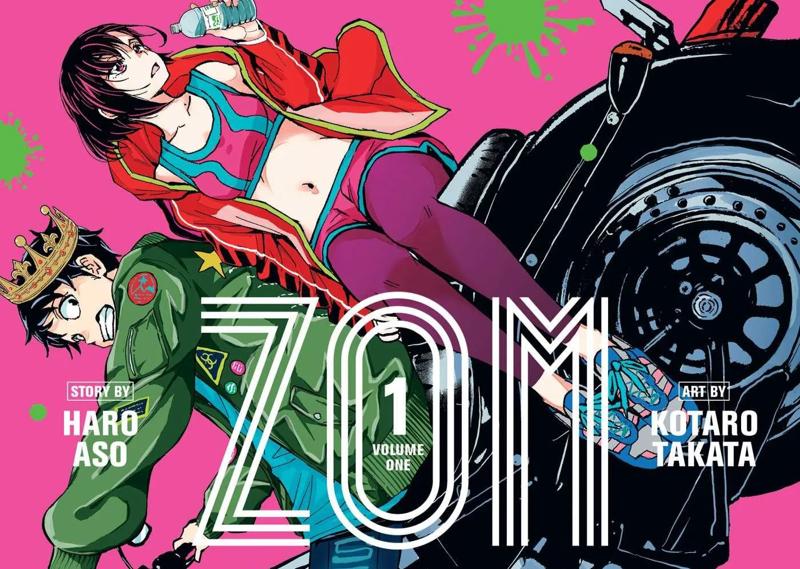
Zom 100: Bucket List of the Dead continues the zombie genre’s tradition of critiquing capitalism and groupthink. Whereas George Romero’s zombie films centered on satirizing consumerism with zombies’ insatiable appetite and single-mindedness, Zom 100 takes on work culture. Throughout the anime, the soul-crushing grind of work takes the fore. Zombies represent the masses who are trapped in their work. Not only are they trapped in their appetite for more, just as Romero’s zombies act, but their appetite points toward work itself. After all, we work ourselves into the ground for more. More video games, more trips, more clothes. But no matter how much more we get, no matter how hard we work to get “ahead”, we want more–just like zombies.
Zom 100 takes this idea further. The majority of the zombies still carry around their symbols of work. Women dress in business suits and carry expensive, still shiny, designer purses. Salarymen shamble in their suits, not too much different from their workdays. Truck drivers still drive their trucks. Firefighters still attempt to put out fires with empty hoses. If you watch the zombies in the background, you will see them trapped in death as they were in life: trapped in work. The anime plays with the idea that it takes the end of civilization to finally break the hold of work on people, to finally wake people up to how to live a full life. How many of us, in our deepest, darkest parts, have wished for some sort of devastation to free us from the never-ending need to grind for money. Even the word grind–back to the grind–illustrates how extreme work can destroy our humanity. Work can crush our sense of self and our human dignity just as millstones grind grain into flour. All the while we tell ourselves that it’s necessary to live, that we are saving for retirement and freedom.
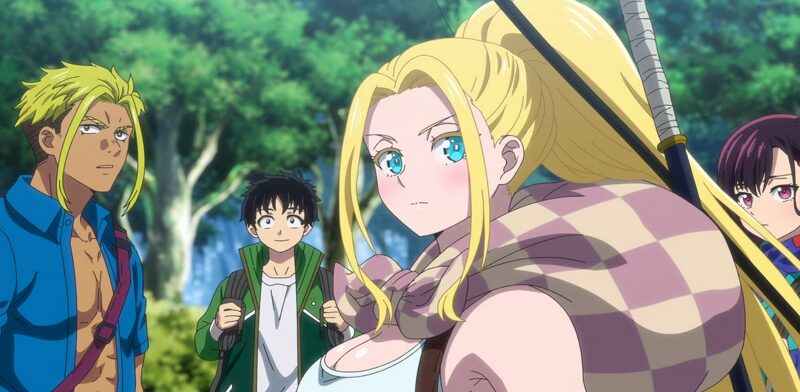
Akira, the main protagonist for Zom 100, suffers a type of post-traumatic stress disorder after 3 years of corporate abuse. He falls into depression and listlessness as work dominates his life. He even ends up sleeping under his desk in the office along with his coworkers. Japan’s extreme grind, which not only comes at the cost of people’s lives–It even has a name: karoshi–but also works against productivity. Rested, happy, and healthy workers do better work. It takes a zombie apocalypse to free Akira. However, this freedom isn’t total. In later episodes, Akira runs into his former boss, and all his unaddressed PTSD returns. Only after confronting his former boss and his own work trauma does he truly become free. Not even the end of the world can free us unless we do the inner work to free ourselves. For Akira, it took the end of civilization for him to begin working on himself. Zom 100 uses Akira’s notebook to represent this. He creates a bucket list of what he’s always wanted to do but couldn’t. He then works through the list, which gets in touch with some of his deepest inner longings. The list gives him purpose and drives the plot forward. In many ways, the list becomes the main character. Akira’s friends add to the list and help each other achieve their goals, no matter how grandiose or humble. But the list only came from Akira realizing death–the death of civilization and his own.
And that’s the thrust of Zom 100’s lesson. The realization of death drives us to truly live. The grind of the workaday blinds us to reality. While work matters, it isn’t the most important part of life. Having purpose– helping others, and benefiting the world in our own small way–matters. Work allows for survival and provides resources for us to live our purposes. While sometimes the work we do is our purpose in life, such as creating a company that makes the world a little better, most of the time work is just that–work. In such cases, work can become a barrier to living a good life, as in Akira’s case. This happens because our work allows for someone higher in the pecking order to live their purpose, or what they consider their purpose, such as living for base things like fame and wealth. Exploitation isn’t always a conscious choice, but it happens in the profit shuffle and when we lose sight of the shortness of life. I know, I’m getting close to Marxism here. Karl Marx wasn’t wrong in his critique of capitalism; he took his observations too far. Zom 100‘s critique is the same. Capitalism, when it’s unfettered by conscience and community, leads to exploitation. Too much socialism, however, leads to exploitation too. One is the tyranny of the few; the other is the tyranny of the group. Zom 100 sketches the tyranny of the group in the form of the zombies in addition to the tyranny of the few. Only later in the series does the story touch on how a fragile balance between the two poles works best. But the story also points out how easily that balance can be disrupted.
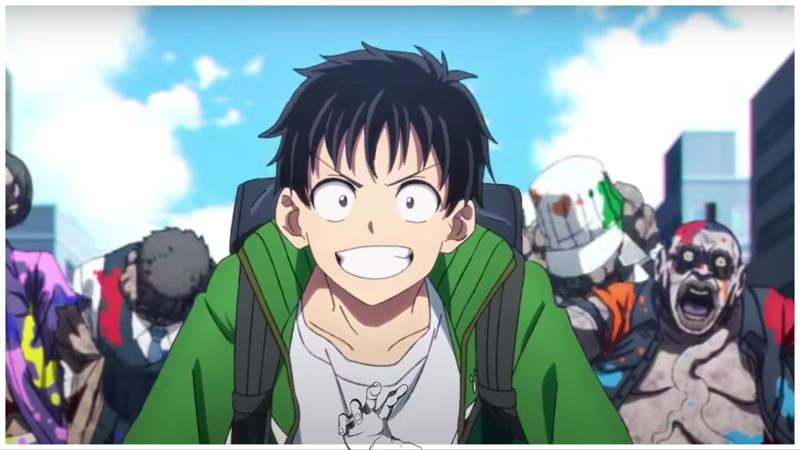
Zom 100 is a fun story. It handles the gore of the typical zombie film like the video game Splatoon splatters its paint. Vibrant paintball colors contrast against the gray world Akira lived in before the zombies took over. Jokes and irony fly as fast as the paintball gore. The humor relies on the same contrast as the visuals, painting the ridiculousness of work culture and modern thinking against the insanity of the end of civilization. How Akira and friends go about their bucket list, which is mostly mundane, amid the ridiculousness of zombies attacks and survival. Unlike other zombie shows like The Walking Dead, Zom 100 retains a light optimism and hope. For the most part, people help each other, which makes Zom 100 more realistic than the unrelentingly pessimistic The Walking Dead. During times of crisis, the majority of people band together to help each other; it’s our human nature. You always get outliers who are selfish and damage the community. Zom 100 points to this. The Walking Dead illustrates the good as the abnormal and the selfish as normal. Zom 100’s view of zombies and human nature makes the story more hopeful and fun. It points toward how we don’t have to work or hurt each other. The story taps into how the awareness of death makes people more compassionate, not less.
As a character, Akira is interesting, if more braindead and impulsive than I would’ve preferred. I expect male anime protagonists to be heartful but brainless. Akira isn’t the worst offender in this regard; he has moments of intelligence. He’s aware that he needs to think more, which is a step up from most anime protagonists. Akira contrasts to the more thoughtful and self-focused Shizuka. Their character arcs intersect as they influence each other. Akira makes Shizuka more selfless; Shizuka makes Akira think more. Shizuka was also affected by unhealthy work culture with her father pushing her to stand on top the meritocracy since she was born.
Zom 100 is a fun time, especially if you are an old-school zombie fan like I am. The story’s humor avoids the annoying, grating comedy anime often falls into. Under the ridiculousness sits interesting commentary about a work culture that’s even more ridiculous than a zombie apocalypse. I’ve been burned out with zombies for awhile, but this anime feels refreshing with its take on the tired zombie genre.
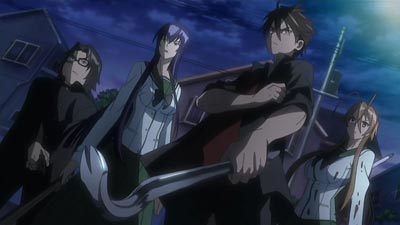
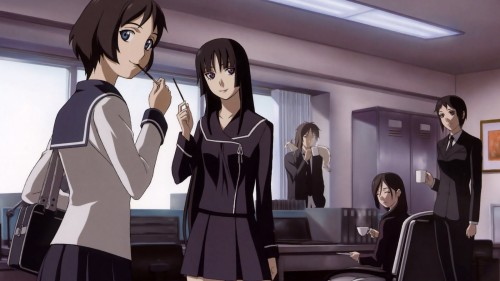
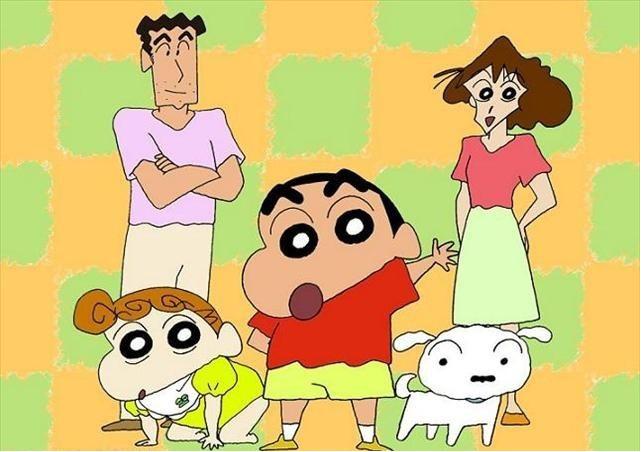

I actually think many “niche” games have more soul to them. Can’t wait to see how yours will develop, Naryunic!
I’m sorry if I go into a bit of talking about myself again, I will shift it in the second part of this comment.
When I commented on that old article about NEETs, we briefly discussed that contributing to culture counts.
I may have escaped the need to have a formal job due to my health and disability, but I keep imposing a strong mentality of “must” and “should” into my life, to the point when I feel guilty not programming or doing graphics/music for my indie game. I keep overworking on my computer not having priorities in the right order, not knowing what I actually want, and so on. Even without a job, I do sometimes feel like a zombie, because of guilt that I’m not formally working, so I at least “must” and “should” compensate for that, right!?
No, my game most surely won’t be a hit, especially since it’s a small 2D mmorpg-style game inspired by the Flash game era of Japanese multiplayer social games (Kind of like Club Penguin was for some in the west, but different) …Which makes me think to not get too big in popularity, since server hosting would become a nightmare.
Nowadays there seems to be a strong emphasis of “you must succeed” when going into game development, most surely imposed by the need of game devs to make money as well. It is said most Flash game developers from the old days turned to Steam and so on. When I was little, I wanted to make freeware games from the pure joy and passion for making games. Just how much does exposure to the world’s financial system change a person, right? Needless to say, it triggers strong feelings of FOMO in me.
So I’m not sure how “contributing to culture” can be defined, is it mandatory to aim for popularity? Obscure media exists and little corners of the internet have been around since its beginnings. In anime, we won’t see very obscure ideas projected as often unless something is funded by miracle somehow,
How tangible is being a salaryman vs contributing to culture, once, for example, I turn my game into a small business, not expecting to change the lives of millions of people at all, but instead devote time and resources to let imagination run wild and create something that may not be popular, but still goddamn cool?
I find time and time again, that the lives of humans are simply not meant to be measured as equal (opportunities, responsibilities, limitations, …), and some people simply end up not being trapped by the constant need to have to work, or even worse, overwork. Zom 100 seems to show the what ifs of what if the constant striving to keep economy going was suddenly cut apart and replaced with a different reality. It’s interesting to explore the ideas of “what if this didn’t matter anymore” because it makes it apparent that a lot of our stress and work and duties are pushed as a sort of theater play and I came up with a weird analogy for the matter of affairs, “If someone strives to be super saiyan in the real world, it’s corporations in capitalism.” Over-optimizing gains. Maximum profits, minimum costs/losses/upkeep/etc, which we see with advancements in AI. One would think that surely, this would stop if AI replaces people’s jobs, but most of my friends with whom I discussed this topic, told me that AI tools will only push the productivity of content but still manage to set people up in positions to overwork. I’m honestly not too good at projecting this aspect into reality much, but I’d hope that’s false. I still reserve some priority to being optimistic.
I would love to elaborate on capitalism/socialism too, but I don’t feel like doing so and I don’t want to write an entire essay. It’s good for anime’s plot to be based on the ridiculous work culture, spread the messages, even though many people already realize it. Japan is in hard mode and I can’t grasp, for example, how insanely strong a mangaka can be to illustrate a long-running story for many years without being burnt out with FOMO and wanting to experience something different from the usual grind and story… I realize they get paid well, but I wouldn’t do something so crazy even for millions. Yet I keep suffocating myself with my game and neglecting/feeling bad about playing games myself and/or doing something to take a rest.
PS: I will make a habit to read your articles on the actual japanpowered.com site from now on, since I appreciate your articles a lot. Writing is still something I appreciate and unpopular opinion, but I can’t stand videos much, I prefer reading.
-Charles
Society has a “go big or go home” mentality. People prefer the big splash and aren’t trained to see that even a small pebble sends ripples across the surface of a pond. Those ripples may disappear within a short distance, but the surface of the water still moves once those ripples are no longer visible. Positively affecting one person contributes to society because that person will then go on and positively affect another, and then that person will go on. The ripples from your pebble will become invisible as your impact moves from person to person, but the ripple your pebble creates remains.
Game development has entered a difficult period with profit-before-all-else thinking driving away talented developers. It’s not sustainable.
I don’t envy you with programming the server-side part of your game. I dabbled in such programming in my more ambitious years and never succeeded. Of course, back then there weren’t as many tools that streamline game development as you have now. I had to build game engines, physics engines, and server-side interfaces from scratch.
As Zom 100 points out, the problems people face within the callous economic machine happens because people forget about death. The machine is made by people who use it to avoid the reality of death in various ways. Once you understand death, truly understand it, you become content with the small aspects of life. You no longer feel the pull of the economic machine, or, at least, the pull weakens. You’re right about LLMs. We can’t predict how they will shift the economic machine. They may democratize game development, movie development, animation, and other creative endeavors even more than current software.
I share your preference for reading over video. Videos are fine for certain types of content, but they have drawbacks that make them ill-suited for addressing certain topics.
Your writing is really good, it managed to soothe me in some ways.
Then that confirms what I thought in the first place. I live in a country where many people with whom I spoke about game development, usually middle aged people, actually oversized my game development efforts, rather than ask me if I’m doing something big/popular/known. So even my “go home” niche game was very impressive to them. The analogy with ripples makes sense, and I admit that I didn’t think of it that way. Many times, while popular games can offer quality entertainment, there are also some obscure games no one talks about, and surprise, it can even be a rare obscure game no one played on Itch.io, sometimes even businesses or small game studios undertake “experimental” and risky ideas, but I know a case where a Japanese online game never found any success internationally, even if it was localized for a few years. That game however is my greatest memory, far exceeding any popular games I’d played until today. Unknown niche games change people’s lives too. It’s a sort of feeling of “if anyone can make it, they can make a hidden gem if they’re using the right mix of experimental ideas”
A difficult period for game development. So I wasn’t just hallucinating when using Twitter/X in the recent past. I hope things will change for the better if you say it’s not sustainable, but until then, I can recalibrate into doing whatever as long as I have the opportunity.
Programming the server has been an enjoyable experience, I’m using the Go language specifically and I can understand the difficulty of networking with tools that weren’t as streamlined. I wanted to get into hobbyist assembly programming for the NES (homebrew), but I can’t imagine doing that without investing more time into it because it is a rabbit hole.
I can’t really say I give much importance to forgetting about death, but I also seem to have lost the feel for what made game development so special for me in the first place. My current big project is not absolutely set in stone and may be changed/repurposed as I pivot with my mental challenges. There are a lot of things I want to try, and there were many failures in my experience and path.
I agree about the LLMs, but I see no need to elaborate, respecting the length of this reply too.
Videos are currently not very enjoyable for me since I gave priority to games and written formats (dialogues, visual novels, …) and there was a long period of time when I blocked YouTube on my computer voluntarily, even after the block was removed due to an OS reinstall, I rarely visit YouTube nowadays.
Videos were my main limitation when I wanted to learn 3D modeling, because most guides, courses and tutorials are in video format, and I’d prefer text with pictures, but those seem to be rare/incomplete. Reading the official Blender documentation is not something I tried yet, but I’m not sure if it would be enough. The video content tends to be very long to learn fundamentals of how the program works, and I just can’t sit through it. And also, exactly, videos are ill-suited for some topics, even in entertainment, I found the power of light novels even more interesting than anime due to what emotions the writing and reader’s imagination invokes. For the record, I actually don’t watch anime much anymore. I’m still interested to read your articles about anime and I don’t mind the spoilers.
Thank you for the reply, your efforts do influence people indeed, like the ripples in water.
Whenever you doubt the worth of the games you develop, remind yourself what you wrote here. A small, niche game inspired you, and your small, niche game will–unknown to you–inspire someone too.
I never got into NES homebrew programming. Programming a Motorola 68000 and a few robots in assembly was enough for me. But if you get into it, best of luck! People do cool things with NES hardware.
Visual novels are an interesting genre. I’ve read only a handful. They exist in an interesting boundary space between novels and video games. They cost about the same amount as a hardback book. They refer back to the “Choose Your Own Adventure” books I used to read/play as a kid. With their branching stories and multiple endings, VNs would be difficult to write!
Sometimes the best way to learn 3D modeling software is to plunge in and experiment. It takes longer, but you learn more about the software. That’s how I learned 3ds Max. While the software suites are different from each other, they work on the same principles, so learning one allows you to transfer to other suites. When I needed to use Blender for a project, I was able to pick it up and use it within about 20 minutes of fiddling thanks to knowing an ancient version of 3ds Max. As you point out, videos are about the only way you can learn such software now. Blender’s documentation and tutorials are decent though! I used those in addition to fiddling.
Keep at it! As long as you are learning what works and what doesn’t work, no project is a failure.